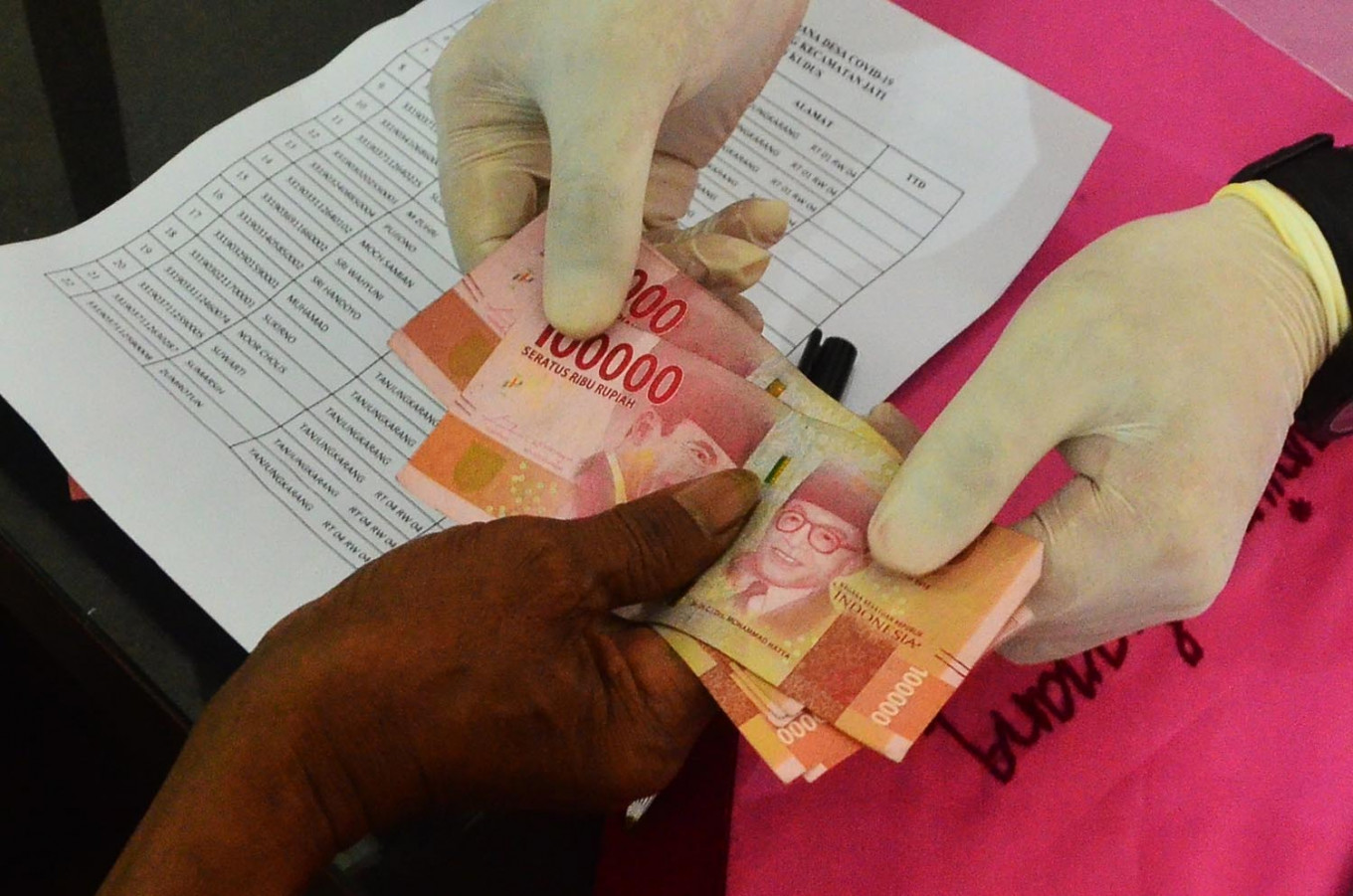Govt to disburse cash transfers for workers to bolster spending
Some 15.7 million workers with a salary below Rp 5 million and are registered with BPJS Ketenagakerjaan will receive Rp 600,000 in monthly assistance over four months.
Change Size
 The pandemic has lowered the income of all kinds of businesses, from small to medium-sized to large, the President said.
(Antara/Yusuf Nugroho)
The pandemic has lowered the income of all kinds of businesses, from small to medium-sized to large, the President said.
(Antara/Yusuf Nugroho)
T
he government will start to disburse Rp 2.4 million (US$163) in cash aid for workers starting on Thursday as part of its latest measure to boost spending reeling from COVID-19, President Joko “Jokowi” Widodo has announced.
The pandemic has lowered the income of all kinds of businesses, from small to medium-sized to large, he said.
“We are hoping that household spending may increase after this,” Jokowi said during the launch of the program. “I think this is a complete [package] that will be given to honorary workers, firefighters, hotel employees, medical workers or anyone that paid their premium to BPJS Ketenagakerjaan [Workers Social Security Agency].”
Some 15.7 million workers with a salary below Rp 5 million and are registered with BPJS Ketenagakerjaan will receive Rp 600,000 in monthly assistance over four months. The government has allocated Rp 37.7 trillion from the state budget for the program.
The first phase of the program would see the government disburse cash transfers for 2.5 million workers, said Manpower Minister Ida Fauziyah, adding that BPJS Ketenagakerjaan had so far verified the data of 10.8 million workers or 69 percent of the target.
“The cash aid is expected to maintain people’s purchasing power and boost spending so that it would have a multiplier effect on economic growth and prosperity,” she said during the same event, adding that the cash transfers will take time, until the end of September.
The cash aid will be transferred to workers through state-owned banks under the auspices of Himbara, she went on to say, adding that Bank Mandiri would disburse the money to 700,000 workers, Bank Negara Indonesia (BNI) to 900,000 workers, Bank Rakyat Indonesia (BRI) to 600,000 workers and Bank Tabungan Negara (BTN) to 200,000 workers during the first phase.
The government has allocated Rp 695.2 trillion stimulus to jack up the economy, which is expected to shrink by 1.1 percent at worst or grow by 0.2 percent at best this year, marking the worst economic performance since the 1998 and 1998 Asian financial crises.
The government has only spent 25.1 percent of the Rp 695.2 trillion stimulus as of Aug. 19, five months since the start of the outbreak, as red-tape bureaucracy and lack of citizens’ data held up disbursement of the much-needed stimulus.
Former Finance Minister Chatib Basri has said that the government would need to allocate the slow-disbursed stimulus to the social protection program, adding that it would boost consumer demand, which is needed to revive the economy.
“The only spending that could achieve the level of absorption quite significant is the social system and not tax incentives,” he said on Aug. 19, adding that the government should be more “pragmatic by allocating funding that [it] could spend”.
“The government needs to bolster consumer demand by providing cash transfers for lower to middle-income citizens, which in turn will boost the supply side of the economy.”
Providing cash transfers to lower-middle income citizens will greatly enhance domestic spending, he added.
Meanwhile, University of Indonesia (UI) economist Ari Kuncoro said the government’s stimulus would only be effective if people were confident enough to spend their money without risking COVID-19 infection, adding that implementing strict health protocols would be crucial to revive the economy.
“If social restrictions continue and people are unwilling to go outside, then the economy will suffer even more and the stimulus would not be sufficient,” he told The Jakarta Post. “The key to economic recovery is to encourage people to return to their normal activity by using health protocols. That will make the economic wheels run and avoid a greater contraction.”









